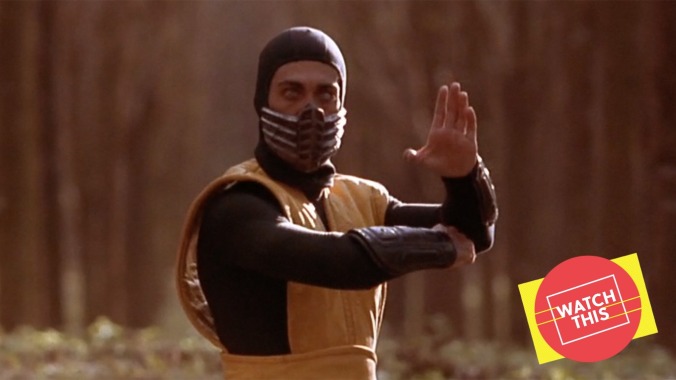Before Resident Evil, the other Paul Anderson got some pure camp fun out of Mortal Kombat

Watch This offers movie recommendations inspired by new releases, premieres, current events, or occasionally just our own inscrutable whims. This week: We’re dusting off a Watch This tradition and looking back on unsung summer blockbusters—the big movies that opened to critical scorn or audience indifference during the warmer weeks, but are better than their reputations (or tepid box office) suggest.
Mortal Kombat (1995)
One problem with movies today is that so few of them open with someone shouting the title over pumping techno music. So let’s go back a quarter century, to the summer of 1995 and the video game adaptation Mortal Kombat. “Mortal Kombat!” is not just the first thing we hear in the movie (over the New Line logo, no less), but also the second and the third. It’s a throaty, drunken yowl, sampled in a theme tune known as “Techno Syndrome.” It takes something like 40 seconds for the title to actually appear, and in that time we are treated to a screen full of fireballs as they erupt from a rotating dragon logo. This opening doesn’t just distill a dated aesthetic. It exudes a level of bozo confidence to which we should all aspire.
What’s good about Mortal Kombat is that it actually lives up to these credits, and features at least three performances that are delightfully aware of the movie’s camp factor: Christopher Lambert as the lightning deity Raiden, Linden Ashby as the vain movie star Johnny Cage, and, above all, Cary-Hiroyuki Tagawa as Shang Tsung. The last of these involves so much scowling that one can’t help but admire the strength of Tagawa’s facial muscles.
The story is dumb. It probably seems even goofier to viewers who are unfamiliar with the first couple of Mortal Kombat games. There’s a once-in-a-generation tournament that pits an assortment of kombatants against the warriors of an alternate dimension called Outworld. That’s pretty much all one needs to know. The effects are subpar—some amateurish mid-1990s CGI and an animatronic four-armed Outworld champion named Goro whose proportions look just plain wrong. The scenes that are supposed to be set in China and Hong Kong were very obviously filmed in Thailand and California. On the whole, very little of this matters.
What we really have is a bunch of characters fighting supernatural ninjas and sweaty bare-chested henchmen through a series of dungeons and beach-vacation locales. There’s Liu Kang (Robin Shou), who’s avenging his brother; Sonya Blade (Bridgette Wilson), who is pursuing Kano (Trevor Goddard), a fugitive with an Australian accent and a glowing red eye that sits an inch below where his eye socket should be; and the aforementioned Johnny Cage, who is out to prove that he’s no phony. That anyone would care if an American movie star in the 1990s did his own stunts is funny on its own, but nowhere as good as the various tabloid props that are used to establish this basic motivation.
One thing worth noting here is that Mortal Kombat was the second feature (and first video game adaptation) to be directed by Paul W.S. Anderson, the B-movie auteur behind the Resident Evil film series and Event Horizon. It’s in this sense a transitional work. There’s a catacomb chase and a spiky floor that prefigure the death-trap mazes of his later movies, and a fair number of ruins, portals, and lairs with substantial candle and lantern budgets.
But what it really has in common with other Anderson concoctions is pacing. Mortal Kombat was a big hit and even produced a platinum-selling soundtrack—yet at no point does it feel like a blockbuster. It’s fast, weightless, blatantly kid-friendly. Though the games were at some point considered beyond-the-pale in terms of arcade gore, the movie’s violence is minimally gruesome and largely inspired by Hong Kong martial arts films. Apart from Shou, no one in the cast seems to be laboring under the delusion that they’re about to be catapulted to stardom, and in general the characters are silly in ways that Hollywood heroes and villains rarely are.
Everyone is yelling catch-phrases or delivering absolute gems of dialogue like “My dominions are well-known to me, sorcerer.” There is no way to take a sentence that includes the words “Mortal Kombat” seriously, because you somehow always hear the “K,” and the script offers up ideal examples of bad fantasy dialogue: “You have been chosen to defend the realm of Earth in a tournament called Mortal Kombat,” “The essence of Mortal Kombat is not about death, but life,” and so on. It’s hard to watch it without an ear-to-ear grin. And that “Mortal Kombat!” sample? Oh, they play it again.
Availability: Mortal Kombat is currently streaming on Netflix. It is available for digital rental or purchase from Amazon, Google Play, iTunes, Youtube, and Vudu.